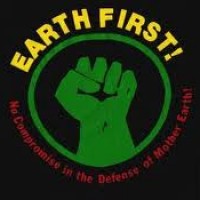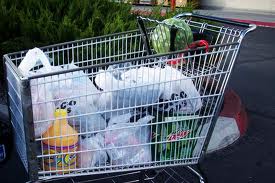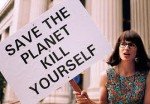Consumers Left Holding the (reusable) Bag

Contrary to the “myth propagated by environmental lobbyists, plastic bags are not a significant source of waste”
by Lou Ann Anderson at Watchdog Wire
Plastic bag bans: responsible environmental stewardship or government intrusion into the affairs of both private citizens and businesses? As Dallas embarks on this public debate, varying perspectives offered in The Dallas Morning News give insight to similar discussions likely occurring across the state.
While nationwide more than two dozen cities have approved bag bans  or other bag use restrictions, such efforts are rarely passed without controversy. To date, only Austin, Brownsville, Fort Stockton and South Padres Island stand as Texas cities having taken such action, but similar measures are currently under consideration in Dallas as well as reportedly in San Antonio, Corpus Christi and Odessa.
or other bag use restrictions, such efforts are rarely passed without controversy. To date, only Austin, Brownsville, Fort Stockton and South Padres Island stand as Texas cities having taken such action, but similar measures are currently under consideration in Dallas as well as reportedly in San Antonio, Corpus Christi and Odessa.
Regarding the public debate, it’s first interesting to note ban proponents invoking the term “single-use” as a descriptor of the plastic bags at issue. In Bag the Ban, an article published upon Austin’s ban implementation, Watchdog Wire contributor Jenna White said this of such terminology:
Proponents of the bag ban are winning the war of definitions here. Studies around the issue show that of people who opt for plastic bags at the store, up to 90% reuse their bags in some way. From lining their trashcans to picking up after their dogs, most people use their bags at least twice, and studies show that plastic bags are reused as a trash bag about 65% of the time. Why call plastic bags that almost all of us reuse “one-use”? Because bag bans make local politicians feel like they are being environmentally conscious, that’s why. But bag bans aren’t reducing waste as much as they would hope. A study by the government of Australia found that trash bin liner sales there would go up between 50 and 80% when grocery store carryout bags were banned. We aren’t going to use fewer bags in Austin – just different ones.
Along similar lines, Dallas Morning News columnist Jacquielynn Floyd recently noted how despite her “predictable, kneejerk lefty response on this question every time I see the vile things stuck in creeks, flapping in trees, or blowing in ugly plastic tatters along fences,” the “ban ‘em all!” reflex is tempered by a reality of the bags’ secondary use.
She continued:
As a balancing measure, I try to limit the number of the things we bring into the house. I carry reusable bags in the car and use them much of the time, but I keep enough of the plastic ones on hand for catbox doo-ty. Isn’t responsible re-use of these bags beneficial, too?
Zac Trahan doesn’t appear to agree. In an op-ed, the D/FW program director of the Texas Campaign for the Environment defended reusable bags quoting a Consumers Union senior staff scientist who says “claims that reusable bags cause health hazards are based on a study financed by the main lobbying arm for the plastic bag industry — and none of the bacteria found were strains that would normally make people sick.”
In addressing economics of the issue, Trahan maintained bag bans bring multiple benefits from decreasing littering (thereby lowering municipal clean-up costs) to seemingly implying less bags reduce the need for natural gas drilling (i.e., fracking). He also claimed Kroger admits the ban would save the company money and that Texas businesses “are creating more reusable bags and jobs along with them.”
Texas Campaign for the Environment (TCE) is a nonprofit, nonpartisan 501(c)(4) organization whose web site says contributions “are not tax-deductible because we want the freedom to organize to affect public policy and hold elected officials accountable to the residents of Texas.”
Trahan further called bag bans sensible measures not causing economic damage “despite what ideological think tanks would have us believe.” Being undoubtedly guided by his own organization’s political belief system and agenda as well as quoting a similarly positioned advocacy group, does Trahan see his and his allies views as non-ideological?
 The “ideology” to which he refers likely comes from the National Center for Policy Analysis (NCPA), a nonprofit, nonpartisan public policy research organization established in 1983 to develop and promote private, free-market alternatives to government regulation and control, solving problems by relying on the strength of the competitive, entrepreneurial private sector.
The “ideology” to which he refers likely comes from the National Center for Policy Analysis (NCPA), a nonprofit, nonpartisan public policy research organization established in 1983 to develop and promote private, free-market alternatives to government regulation and control, solving problems by relying on the strength of the competitive, entrepreneurial private sector.
In another Morning News op-ed , NCPA senior fellows H. Sterling Burnett and Pamela Villarreal offer perspective of what happened two years ago when Los Angeles County implemented a plastic bag ban for only unincorporated areas of the county. As a city bag ban will undoubtedly impact surrounding areas, these findings could suggest what’s ahead for Dallas.
- A survey conducted by the NCPA indicates that consumers who lived in unincorporated areas crossed over into incorporated areas to shop where plastic bags were available. Reports from Austin, Texas, show similar results.
- Additionally, Los Angeles County’s bag ban negatively affected employment at stores inside the ban area. While every store inside the ban area was forced to terminate some of its staff, not a single store outside the ban area dismissed any staff.
- Stores inside the ban area reduced their employment by more than 10 percent. Stores outside the ban area increased their employment by 2.4 percent.
- The cost to taxpayers also will rise as lawsuits are filed challenging these bans.
Burnett and Villarreal additionally state that contrary to the “myth propagated by environmental lobbyists, plastic bags are not a significant source of waste” and cite the following data:
- Indeed, the national 2009 Keep America Beautiful study does not even include plastic bags in its top 10 sources of litter.
- A recent study found that plastic grocery bags make up less than 0.6 percent of the overall waste stream.
- Even this small amount will be reduced absent government interference, as plastic bag recycling is taking off. A number of major retailers have set up recycling boxes at the entrance of their stores to encourage recycling, and plastic bag recovery has increased by 31 percent since 2005.
- According to Environmental Protection Agency data, this growth is more than nine times the 3.4 percent increase in recovery of all municipal solid waste from 2005 to 2009. Retailers have consistently argued that recycling is the best way to meet environmental goals.
They conclude by describing plastic bags as a “minuscule waste problem, and every city that bans plastic bags costs its shoppers, businesses, the city government and workers with little or no benefit for the environment.”
Morning News editorial writer Mike Hashimoto weighed in with his own practical, humor-laced (and well deserved) take by first reminding readers how the champion of Dallas’ bag ban, City Councilman Dwaine Caraway, has an “apparent war on grocery stores” when also thinking back on his 2010 unsuccessful (thankfully) effort to charge retailers $500 for every shopping cart stolen and abandoned in Dallas.
Hashimoto provided this characterization of Caraway’s vision:
In terms of fees, Caraway suggested that the costs of providing reusable bags in place of the traditional single-use plastic bags fall on grocery stores or product manufacturers.
“I really do not want to see the consumer have to pay anything for these bags,” Caraway said about the ban he first proposed in March. “I’m not looking for a money generator. … I do not think the consumer should have to pay one dime for these bags.”
“Very Man-of-the-People” Hashimoto proclaims. Indeed. Mandating a new cost for business while precluding the business from directly assessing consumers the charge won’t just cause prices to be raised in other areas?
Caraway has to know — or should know — that that’s not
how the world works. Giving away reusable bags at no charge adds to the bottom lines of a Kroger or Tom Thumb (or every Quick-and-Rob convenience store). When expenses go up, this time through government mandate, what’s a private business to do?
Correct. An extra few cents on pork chops, for instance, or detergent or Twinkies or, god forbid, beer. Grocery stores work on a fairly thin profit margin as it is; if a government insists its costs must go up, you, the customer, can expect to cover it.
Hashimoto aptly notes such a measure will benefit the nanny state and the reusable bag industry while creating new costs and controls for both consumers and businesses.
Plastic bag bans: responsible environmental stewardship or government intrusion into the affairs of both private citizens and businesses? Hopefully Dallas residents will recognize the difference.
Lou Ann Anderson is an information activist and the editor of Watchdog Wire – Texas. As a Policy Analyst with Americans for Prosperity – Texas, she writes and speaks about a variety of public policy topics. Lou Ann is the Creator and Online Producer at EstateofDenial.com, a web site that addresses the growing issue of probate abuse in which wills, trusts, guardianships and powers of attorney are used to loot assets from intended beneficiaries or heirs. Contact Lou Ann at Texas@WatchdogWire.com with story ideas and for ways to get involved with citizen journalism in Texas.
Help Make A Difference By Sharing These Articles On Facebook, Twitter And Elsewhere:
